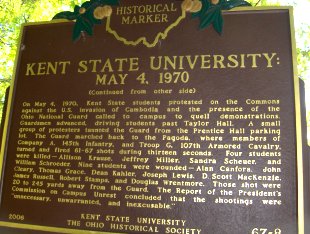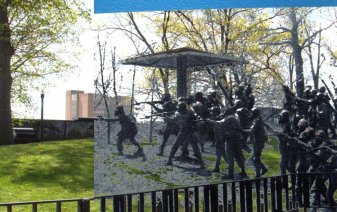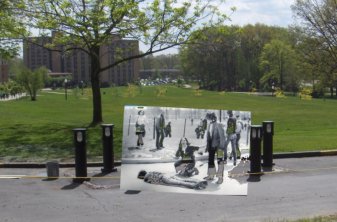![]()
Remember "Kent State" - Think "Radio"
Publisher's Note: Today marks the 46th year since American troops opened fire on a group of youth at Kent State University. With consideration for the turmoil between America's average persons and its leaders, I thought it appropriate to revisit the actions of our government on that day. The mindset which drives these actions remains throughout much of the radio industry.
Wanting to expand my skills in computers, I joined the Air Force at 18. The AF had other plans, however, placing me in a field that repaired test equipment for aircraft. It was a learning experience; a year's training in electronics, pneudraulics, hydraulics and multiple aircraft systems.
In that AF tech school I was lucky to be chosen as a "Red Rope," a student leader whose responsibilities included overseeing 600 troops attending similar classes. Remember this; we'll return to it later.
|
Today marks the 46th anniversary of Kent State University's infamous shooting of student protesters. KSU is only 18 miles from my house, and following a visit there I thought it appropriate to share these photos of where four students were dropped by bullets from the Ohio National Guard. Authorities of the day saw it necessary to use force to squash an uprising of anti-war protesters. Reasoning: Ideas driving the protest differed from the elders' thoughts and were judged not in the best interest of the masses. |

|
A few weeks after the Kent State debacle, as that Red Rope in a military tech school, I was in a meeting to discuss an upcoming military parade. I recall our leaders giving instruction to myself and a few other Red Ropes in the room that students from the Univeristy of Illinois were rumored to be calling for a peaceful resistance of this parade at Chanute Air Force Base (also in Champaign, IL). The commander's words still ring in my head: "If those bastards get anywhere near the parade grounds and sit down to block this ceremony, you make sure to keep your troops moving over them. We'll show those long-hairs who is in command." In retrospect, this was a moment of change for me because it showed how those in leadership really didn't understand what was happening with public opinion. They refused to see that others could possibly be right, and that maybe it was the leaders who needed to change.
Back then, I believed in the logic to fire on students from a hill - to act without question to whatever leadership asked. I am ashamed at how long it took me to see that this thinking is wrong.
There's a parallel to the action of suppressing public opinion 46 years ago and what we see happening within the ranks of the radio industry today. The body count may not be in deaths, but it certainly has been in careers stopped dead in their tracks.
Today we have industry leaders giving commands that prevent radio from adjusting to a new age of media use. With no resistance, mid-level managers carry out orders so obviously wrong that they prevent good radio. Think of dismantled newsrooms, voice tracking and ten-unit spot clusters. Radio lacks a dissension from within to stop bad moves or force positive change.
Dissension is not unpatriotic. As sure as it is the duty of those in authority to deliver what the masses are calling for, it is a duty for those opposing an authority's outdated approach to be steadfast in calling for reform.
The public, audience and advertiser, desire a change in the way radio operates. We have been hearing voiced dissatisfaction for years.
Though the bloodbath of lost jobs has slowed, the effects of a rigid mindset continue to prevent youth's ideas from getting a foothold - and from leading radio in the right direction. As media consumption changes, leaders aren't listening. They build online concepts according to the latest fad, always two steps behind where a creative concept-building industry should be.
The connection between Kent State's place in history and where radio sits now is this: In both cases, those in control do not believe that dissidents have any chance of being right.
On May 4, 1970, Allison Krause, Jeffrey Miller, Sandra Scheuer, and William Knox Schroeder were killed by Ohio National Guards - which were being used to quiet Vietnam protests on the campus of Kent State University.
Click pictures to enlarge.
 |
 |

|
 |
 |

|
Wednesday, May 4, 2016

Today's artist introduction is to Hard Rock from Cold Steel

Give "Too Fake" a listen.
Stations: Add it to your playlist, free.




